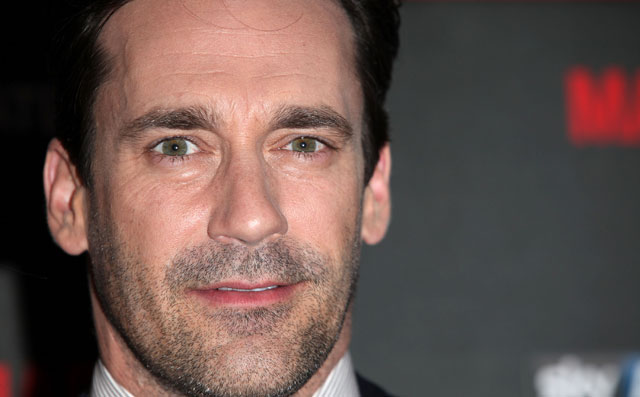The Season 3 finale was a pivotal turning point in the direction of the series, as Don voluntarily moves out, while Betty moves on with her new politician beau Henry. Meanwhile at the office, Don, Roger, Bert and Lane form a new agency -- Sterling Cooper Draper Pryce. They bring Peggy, Pete, Joan and Harry along for the ride, while other supporting characters (Paul Kinsey and Sal Romano) depart from the show.
The Season 6 finale left us plenty of questions for the final season. Will Don and Megan's relationship survive? Will Don return to the company after being forced to take a leave of absence? And can Don reconcile with his children after Sally caught him with his pants down? The answer might lie in his boardroom meltdown, sabotaging his perfect pitch to Hershey by suddenly confessing his dark secrets, including that he grew up in a whorehouse and lost his virginity to a prostitute. As Don brings his kids to the dilapidated house in the final scene, does this offer hope that he's a changed man? We'll have to tune in to find out.
"The Crash" revealed both the root and extent of Don's womanizing compulsion. The latter came as Don's stubbed out cigarettes at Sylvia's doorstep after she broke up with him following his dark hotel entrapment of her. The former came when we learned that Don was raised an orphan in a whorehouse and lost his virginity to a prostitute. This episode also planted the first seeds than Megan might be a proxy for Sharon Tate, the actress wife of Roman Polanski who was murdered in the 1969 Manson Murders. In this episode, Sally is reading "Rosemary's Baby" (directed by Polanski) when the house is broken into by Grandma Ida, showing how easily Helter Skelter could happen. In the next episode, "The Better Half," her red star shirt was eerily similar to the one Tate wore in an Esquire spread shortly before her death. Several episodes later in "The Quality of Mercy," Don and Megan watch "Rosemary's Baby" at the movie theater. Do all these historical connections matter? Don makes his case in this episode, telling Peggy with wild-eyed epiphany about disguising history as entertainment: "If this strategy is successful … it's everything."
The assassination of Dr. Martin Luther King Jr. shocks the nation, incites riots and sparks an argument between Pete and Harry. "This is a shameful, shameful day," Pete cries, calling Harry a racist. Harry spits back, "That's the new thing, isn't it? Everybody's a racist!" Don's experience is much more subtle, witnessing his son's act of compassion toward a black janitor at a movie theater, then pouring his heart out to Megan in a mirror reflection: "I don't think I ever wanted to be the man who loves children. But from the moment you're born, that baby comes out and you act proud and excited, hand out cigars. But you don't feel anything. Especially if you had a difficult childhood. You want to love them, but you don't. And the fact that you're faking that feeling makes you wonder if your own father had the same problem. Then one day they get older and you see them do something, and you feel that feeling that you were pretending to have. And it feels like your heart is going to explode."
Without a doubt, "Commissions and Fees" features the most shocking twist in the series, as Lane Pryce is outed as a financial fraud and hangs himself on the back of his office door. But that's not the only reason this episode stands out from the crowd. Don also delivers the best monologue on his insatiable ambition: "Even though success is a reality, its effects are temporary. You get hungry even though you've just eaten. … You're on top and you don't have enough. You're happy because you're successful, for now. But what is happiness? It's a moment before you need more happiness. I won't settle for 50 percent of anything. I want 100 percent."
Joan finally gets her chance to become a partner in the firm. All she has to do is the most degrading thing ever asked of her: sleep with a client in order to land the Jaguar account. The dirty offer reveals many of the partners as opportunistic pigs, while Don is shown in a very sympathetic light as the one partner who doesn't want her to go through with it. This sympathy is what makes it that much harder to watch Don's heartbreaking goodbye to Peggy, who leaves for another company in a triumphant moment for her, but an unsure moment for the future of the company.
This was easily Roger Sterling's best episode, having an epiphany over his failed marriage during some trippy LSD sequences that rival the dream sequences of "The Sopranos" and the drug trips of "Breaking Bad." It was also a pivotal episode in the development of Megan's character, as Don lashes out at her, worries he's lost her, then comes crawling back to her on his knees.
An episode after quitting Big Tobacco, Don's firm is left in limbo with plenty of layoffs. Don heads back to California, bringing his secretary Megan with him to watch the kids after Betty fires their longtime nanny. Surprisingly, Don and Megan hit it off -- and come back to New York married. If you want Season 5 and 6 to make any sense, you've got to watch this one, because this is where the Don-Megan romance truly begins.
This episode was one of the biggest feminist statements of the entire show, following Peggy, Joan, Megan and Faye's attempts to take care of Don's daughter Sally, who has run away from home. Faye's failure as a motherly figure highlights her career choice, while Peggy insists women's rights issues are just as important as racial issues: "I have to say, most of the things Negroes can't do, I can't do either." Her boyfriend jokes, "Alright Peggy, we'll have a civil rights march for women." To top it off, there's the comedy of trying to cart a dead Miss Blankenship out of the office during a very important meeting.
Arguably the greatest episode, "The Suitcase" explores what's always been at the core of the show -- the relationship between Don and Peggy. The two stay overnight at the office, brainstorming for a Samsonite ad. The sleepover costs Peggy her relationship with her boyfriend, while Don gets the news that his old friend Anna (the real Draper's wife) has passed away. As the tears flow, Don and Peggy form a new bond that remains admirably professional.

Need a quick refresher or cliffs notes version of "Mad Men" before Sunday night's Season 7 premiere?
WTOP Film Critic Jason Fraley has compiled the three most important episodes from each season so far. Here they are in chronological order for your binge-watching glory.
SPOILER ALERT: It's impossible to break down the show's most essential episodes without discussing certain plot points, so this gallery is meant as a refresher of the best of the series.
Having confronted Don last episode about his false identity, Betty tells Don she no longer loves him and wants a divorce. This shattering of the Draper home coincides with the shattering of Camelot with the assassination of President John F. Kennedy, which stops the entire office in its tracks.
Two words: riding lawnmower. As the office throws Joan a going away party, it sparks one of the most comical moments of this often stoic series. Without the blood splatter of a mangled foot, Lane Pryce would not have been allowed to stay on at the company, which would have robbed us of some of the most memorable moments of the series to come. Meanwhile, back on the Draper homefront, Sally suffers nightmares that her dead grandfather is haunting her through her new baby brother Gene. As Don comforts Sally by insisting Baby Gene has his own identity, it doubles as his own hope for a clean slate.
"Mad Men" has tackled many key moments in history, from the JFK assassination in "The Grown-Ups" (Season 3) to the MLK assassination in "The Flood" (Season 6). These events are often depicted subtly in the background, but the Cuban Missile Crisis brings the world to a halt in the Season 2 finale. Don returns from California to learn that his wife Betty is pregnant, while Peggy breaks the news to Pete that she gave away his child.
The Dick Whitman backstory takes another huge turn toward the end of Season 2, as Don pays a visit to Anna, the widow of the real Don Draper and Don's one true friend and confidant. While Don is away, Pete botches the Clearasil account and Joan introduces her fiancé Greg to her co-workers, only for him to rape her right inside Don's office in a true moment of misogyny.
"The New Girl" features one of the most telling moments of a character's life philosophy in all of TV history. After Peggy gives away Pete's kid, Don appears next to her hospital bed and gives her advice that he himself lives by: "Get out of here and move forward. This never happened. You'll be shocked by how much it never happened." This advice comes after Peggy bails out Don to cover up a car accident and affair with Jimmy Barrett's wife, showing a real growth in the Don-Peggy relationship. The icing on the cake is the introduction of Don's new secretary, Jane Siegel, who catches the eye of Roger Sterling.
The Season 1 finale remains one of the top two or three episodes of the entire series. It's here that Pete brings in his father-in-law's account, sparking a juicy ongoing subplot. Peggy not only gives birth to Pete's kid, she gets promoted from secretary to junior copy editor, beginning her long rise through the ranks of a male-dominated corporate world. Don is haunted by his brother's suicide, before delivering the best ad pitch of the entire series for the Kodak carousel, a monologue that sums up the entire series: "There's the rare occasion when the public can be engaged beyond flash. In Greek, nostalgia literally means the pain from an old wound. It takes us to a place where we ache to go again."
The backdrop of the 1960 presidential race between Nixon and Kennedy peaks in this episode with an overnight office party on election night. But the real reason this episode is essential is that it's the first time we realize Don Draper isn't who he says he is, that his real name is Dick Whitman, having stolen the identity of a fellow solider during the Korean War. Pete tries to use this information to blackmail Don, but Bert Cooper's response sets the tone for the rest of the show: "Who cares?"
This is the one that started it all, introducing all the key players at Sterling Cooper, from Roger Sterling's affair with veteran secretary Joan Holloway, to Pete Campbell's flirtations with rookie secretary Peggy Olson. We also see two sides of our anti-hero Don Draper, the shrewd pitchman for Lucky Strike, and the jaded womanizer: "What you call love was invented by guys like me to sell nylons. You're born alone and you die alone. I'm living like there's no tomorrow, because there isn't one." The episode ends with a shocker reveal: Don has a wife and kids at home in the suburbs.








